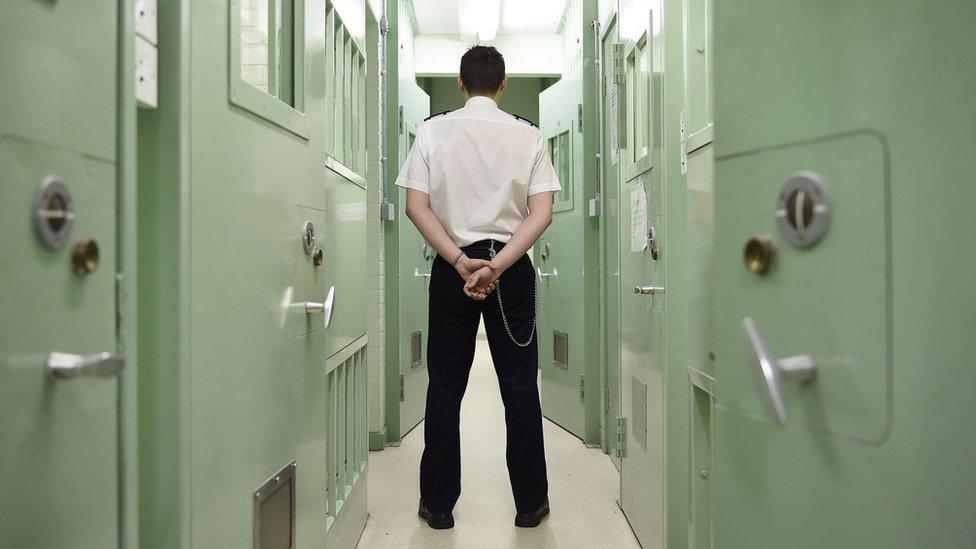General election 2019: Tories back 'whole life orders' for child murder
- Published

Adults who murder children will face life in prison without parole if the Conservatives are elected in December.
The party said it would bring in a new law to make "whole life orders" the starting point when sentencing over 21-year-olds for the premeditated murder of a child under 16.
However, the final sentencing decision would remain with judges.
Justice Secretary Robert Buckland said the policy would tackle "genuine concern" about sentencing.
Similar plans were reported by the Sunday Telegraph in September and were expected to form part of the Queen's Speech after Prime Minister Boris Johnson ordered an urgent review into sentencing policy in August - but the policy was not announced.
The Conservatives' plan would see changes to Schedule 21 of the Criminal Justice Act 2003, which provides the starting point for judges considering whole life orders for murderers in exceptionally grave cases.
This happened in the case of Mark Bridger, who was given a whole life sentence in 2013 when he was convicted of abducting and murdering five-year-old April Jones in a sexually motivated attack.
Currently, for a judge to grant such an order, the rules require the murder to be of multiple children, to be sexually or sadistically motivated or to involve a child's abduction.
If there is not evidence of these conditions, the offender must still be given a life sentence, but that differs from a whole life order, as a judge can specify the minimum term they must spend in prison before becoming eligible to apply for parole.
This happened in the case of Louise Porton, who killed her daughters - aged three and 17 months - and was sentenced to life with a minimum of 32 years.
The Tories want to extend Schedule 21 to cover any premeditated murder of a child by an adult.
However, judicial discretion will come into play - meaning a judge can decide not to enforce a whole life order when they see fit.


The message from Boris Johnson, since he became prime minister, is that the Conservatives are "the party of law and order".
More police, new prisons, tougher sentences. The latest proposed measures continue that theme.
They're largely symbolic - designed to boost confidence in the criminal justice system - and would affect only a dozen or so of the 50 to 60 child homicide cases every year.
Arguably, what's more significant is the Tories' plan to improve education and training across prisons to increase employment levels on release.
Justice secretaries have tried and failed to do this before, so expectation levels will be low - but the prize for success, in terms of reduced reoffending rates and fewer victims, is huge.

Mr Buckland acknowledged that the new rules would only affect a limited number of cases, but child murders can "send a real shockwave, either through the local community or the wider public".
"That's why I think it's important we send a clear message," he told BBC Radio 4's Today programme.
"Amending the law to make the starting point a whole life order means that there would have to be particular reasons, spelt out clearly, for a judge to depart from that."


There is already a mandatory life sentence for murder, but that does not mean murderers necessarily spend their whole life in prison.
It does mean after release that they remain on licence for the rest of their life, having to meet certain conditions or else be recalled to prison.
But some crimes can carry a "whole life" sentence meaning a criminal will never be eligible for parole.
The Conservatives' proposals would change the sentencing "starting point" for all child murderers to a whole life tariff.
When it comes to sentencing, each crime has a "starting point" - a presumed minimum term from which the judge subtracts, or to which they add based on any mitigating or aggravating circumstances.
For example, a murder involving a knife committed by someone over the age of 18 carries a starting point of 25 years.
But a judge may choose a harsher or more lenient sentence than 25 years depending on the individual case.
As it stands, a judge can already choose to hand down a whole life sentence for the murder of a child - this would just mean it is the automatic starting point.
And this will apply to a small number of cases - there are typically fewer than 50 homicides of under-16s per year, of which a far smaller number will be premeditated murders where there was an intent to kill.

The Conservatives have also announced plans to try to get more former prisoners into work after they complete their sentences.
The goal is to double the number of those in employment six weeks after their release, with measures including a "prison education service" to oversee learning across all jails, more workshops to employ prisoners during their sentences, and a dedicated work coach in every prison to link inmates with job centres ahead of their release.
Meanwhile, Labour has pledged to reverse cuts to prison staff and prisons, as well as improve pay and conditions.
The party has also promised to scrap shorter prison sentences, which it argues will reduce reoffending.
The Lib Dems also want to increase the use of non-custodial punishments - such as curfews, community service and GPS tagging - rather than short prison sentences.